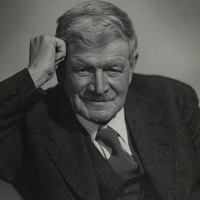The Awful Fate of Melpomenus Jones
Some people—not you nor I, because we are so awfully self-possessed—but some people, find great difficulty in saying good-bye when making a call or spending the evening. As the moment draws near when the visitor feels that he is fairly entitled to go away he rises and says abruptly, “Well, I think I...” Then the people say, “Oh, must you go now? Surely it’s early yet!” and a pitiful struggle ensues.
I think the saddest case of this kind of thing that I ever knew was that of my poor friend Melpomenus Jones, a curate—such a dear young man, and only twenty-three! He simply couldn’t get away from people. He was too modest to tell a lie, and too religious to wish to appear rude. Now it happened that he went to call on some friends of his on the very first afternoon of his summer vacation. The next six weeks were entirely his own—absolutely nothing to do. He chatted awhile, drank two cups of tea, then braced himself for the effort and said suddenly:
“Well, I think I...”
But the lady of the house said, “Oh, no! Mr. Jones, can’t you really stay a little longer?”
Jones was always truthful. “Oh, yes,” he said, “of course, I—er—can stay.”
“Then please don’t go.”
He stayed. He drank eleven cups of tea. Night was falling. He rose again.
“Well now,” he said shyly, “I think I really...”
“You must go?” said the lady politely. “I thought perhaps you could have stayed to dinner...”
“Oh well, so I could, you know,” Jones said, “if...”
“Then please stay, I’m sure my husband will be delighted.”
“All right,” he said feebly, “I’ll stay,” and he sank back into his chair, just full of tea, and miserable.
Papa came home. They had dinner. All through the meal Jones sat planning to leave at eight-thirty. All the family wondered whether Mr. Jones was stupid and sulky, or only stupid.
After dinner mamma undertook to “draw him out,” and showed him photographs. She showed him all the family museum, several gross of them—photos of papa’s uncle and his wife, and mamma’s brother and his little boy, an awfully interesting photo of papa’s uncle’s friend in his Bengal uniform, an awfully well-taken photo of papa’s grandfather’s partner’s dog, and an awfully wicked one of papa as the devil for a fancy-dress ball. At eight-thirty Jones had examined seventy-one photographs. There were about sixty-nine more that he hadn’t. Jones rose.
“I must say good night now,” he pleaded.
“Say good night!” they said, “why it’s only half-past eight! Have you anything to do?”
“Nothing,” he admitted, and muttered something about staying six weeks, and then laughed miserably.
Just then it turned out that the favourite child of the family, such a dear little romp, had hidden Mr. Jones’s hat; so papa said that he must stay, and invited him to a pipe and a chat. Papa had the pipe and gave Jones the chat, and still he stayed. Every moment he meant to take the plunge, but couldn’t. Then papa began to get very tired of Jones, and fidgeted and finally said, with jocular irony, that Jones had better stay all night, they could give him a shake-down. Jones mistook his meaning and thanked him with tears in his eyes, and papa put Jones to bed in the spare room and cursed him heartily.
After breakfast next day, papa went off to his work in the City, and left Jones playing with the baby, broken-hearted. His nerve was utterly gone. He was meaning to leave all day, but the thing had got on his mind and he simply couldn’t. When papa came home in the evening he was surprised and chagrined to find Jones still there. He thought to jockey him out with a jest, and said he thought he’d have to charge him for his board, he! he! The unhappy young man stared wildly for a moment, then wrung papa’s hand, paid him a month’s board in advance, and broke down and sobbed like a child.
In the days that followed he was moody and unapproachable. He lived, of course, entirely in the drawing-room, and the lack of air and exercise began to tell sadly on his health. He passed his time in drinking tea and looking at the photographs. He would stand for hours gazing at the photographs of papa’s uncle’s friend in his Bengal uniform—talking to it, sometimes swearing bitterly at it. His mind was visibly failing.
At length the crash came. They carried him upstairs in a raging delirium of fever. The illness that followed was terrible. He recognized no one, not even papa’s uncle’s friend in his Bengal uniform. At times he would start up from his bed and shriek, “Well, I think I...” and then fall back upon the pillow with a horrible laugh. Then, again, he would leap up and cry, “Another cup of tea and more photographs! More photographs! Har! Har!”
At length, after a month of agony, on the last day of his vacation, he passed away. They say that when the last moment came, he sat up in bed with a beautiful smile of confidence playing upon his face, and said, “Well—the angels are calling me; I’m afraid I really must go now. Good afternoon.”
And the rushing of his spirit from its prison-house was as rapid as a hunted cat passing over a garden fence.


